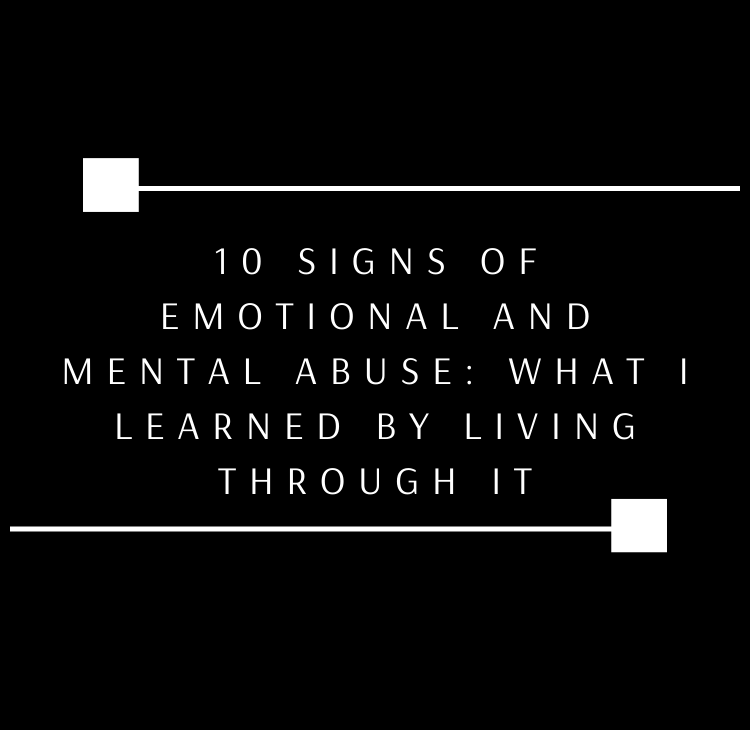
10 Signs of Emotional and Mental Abuse: What I Learned by Living Through It
I always thought abuse was something you could easily see and recognize. But when I finally realized I was living in an emotionally abusive relationship, I saw just how subtle, confusing, and painful it could be.
Abuse doesn’t always leave visible scars; sometimes, it leaves you feeling lost, doubting yourself, and wondering where the person you used to be has gone.
These are ten signs of mental and emotional abuse that I learned from my own experience. If you’re wondering if something feels wrong in your relationship, trust your instincts.
These signs aren’t always easy to spot, but they’re real, and recognizing them can be the first step toward healing.
Constant Criticism That Chips Away at Your Confidence
One of the first things I noticed was how his words could make me feel small without him raising his voice. He’d find ways to criticize me over little things: how I dressed, spoke, my children, even my hobbies and opinions. He’d disguise it as “constructive feedback” or “trying to help me improve.” But instead of feeling supported, I felt like I was shrinking. I stopped doing things I enjoyed and doubted my abilities, questioning whether he was right.
Constant criticism isn’t love, and it isn’t constructive. It’s a way of chipping away at your self-worth, leaving you feeling like you’re always falling short, no matter how hard you try.
Gaslighting: Making You Doubt Your Own Reality
One of the hardest things to endure was the gaslighting. I’d bring up something that bothered me, and he’d say I was “too sensitive,” “imagining things,” or “overreacting.”
Sometimes, he’d deny saying things entirely, twisting my memory and making me question my own sanity. I started to doubt myself, wondering if I was being too sensitive or misunderstanding him.
Gaslighting leaves you feeling lost and uncertain, even questioning your own mind. Abusers use it to keep control, making you dependent on them for what is “real.” It took me a long time to trust my memory and feelings again.
Isolation Disguised as “Love” and “Protection”
At first, he made it seem like he just wanted me all to himself because he loved me so much. He’d tell me my friends didn’t care about me, that they were a bad influence, or that I didn’t need anyone else as long as I had him. There were little digs at the people I cared for in a way that made me believe it was true.
Over time, I stopped seeing my friends and family. Some because I believed his words. Some because I doubted mine. But mostly because it was easier.
Isolation isn’t love. It’s a way for abusers to cut off your support system and make you feel like they’re the only person you can rely on. Without anyone else to turn to, I became more and more trapped in his world, with fewer people to help me see things clearly.
Mood Swings That Keep You Walking on Eggshells
One minute, he’d be sweet and affectionate; the next, he’d be cold, sarcastic, or angry without warning. I never knew what would set him off, and I constantly tried to avoid his “bad moods.” I thought if I was careful enough, I could keep things calm. But no matter how hard I tried, I was always waiting for his next outburst.
This pattern kept me in a constant state of anxiety, constantly guessing and always worrying. Abusers use unpredictable mood swings to make you feel responsible for keeping the peace, even when it’s impossible to please them.
Making Everything About Them and Minimizing Your Feelings
Whenever I tried to express my feelings, he’d quickly turn the conversation back to himself. If I was sad or stressed, he’d find a way to make me feel guilty for “being too negative” or “constantly trying to cause problems.” My emotions became inconvenient for him, and I learned to keep them to myself over time.
Minimizing your feelings isn’t just inconsiderate; it’s abusive. By making me feel guilty for expressing my needs, he kept me from asking for any support, making me feel like my emotions didn’t matter.
Jealousy and Possessiveness Disguised as “Concern”
He’d get jealous whenever I talked to friends, even old ones or coworkers. He’d say he “just didn’t trust other people” and wanted to keep me safe. It sounded caring at first, but soon, I realized he wanted to know where I was, who I was with, and what I was doing all the time. He’d accuse me of hiding things if I didn’t tell him.
Jealousy isn’t a sign of love; it’s a sign of control. By making me feel guilty for seeing people or having a life outside of him, he isolated me further and made me feel like I owed him my loyalty.
Blaming You for Their Emotions and Actions
He’d have bad days, just like anyone, but instead of dealing with his feelings, he’d take them out on me. If he was upset, it was my fault for “not being supportive enough.” If he was angry, I “must have done something to provoke him.” It didn’t matter if I had nothing to do with it—I always felt responsible for his emotions.
An abuser will make you feel like their emotional well-being depends on you, that you’re somehow to blame for their unhappiness. I was apologizing for things I hadn’t done to keep the peace.
“Jokes” That Are Actually Insults
He’d make little comments about my appearance, intelligence, or personality and pass them off as jokes. “You’re so dramatic,” he’d say, or, “You’re hopeless with directions.” When I looked hurt, he’d say, “Come on, it’s just a joke. Lighten up.” I started feeling like I couldn’t take a joke, even though his words were often hurtful and demeaning.
These “jokes” were a subtle way to make me feel small, to keep me doubting myself. Abusers will hide behind humor, using it as a weapon to cut you down without taking responsibility for their cruelty.
Threats, Even If They’re Just Hints
When I realized something was wrong, I tried to stand up for myself a few times. But every time, he’d remind me of what I “stood to lose” if I left him. He’d say things like, “Good luck finding someone else who’ll put up with you,” or, “You don’t want to know what life would be like without me.” He never directly threatened me, but he kept me fearful enough to stay.
These threats were his way of keeping me in line, keeping me too afraid to think about leaving. Abuse doesn’t have to be loud; it can be subtle, leaving you feeling trapped and fearful of what might happen if you stand up for yourself.
Feeling Like You’ve Lost Your Sense of Self
In the beginning, I was strong and confident. But by the end, I didn’t recognize myself. I was constantly apologizing, anxious, and trying to be someone who wouldn’t upset him. I had given up my friends, hobbies, and voice until I felt like I was fading away. I became so used to his criticism and manipulation that I started to believe I was the problem.
Emotional abuse isn’t just about what someone says or does; it’s about how it changes you. I lost myself trying to keep him happy, thinking things would improve if I tried harder. But I learned that abuse is never something you can fix by changing who you are.
Getting out of that relationship took time, courage, and support from friends who saw what I couldn’t. Healing from emotional and mental abuse isn’t easy, but reclaiming my life and rediscovering who I was made every step worth it.
Abuse often starts quietly, but that doesn’t make it any less real or painful. If you see yourself in any of these signs, know that you’re not alone and that there’s help and support out there.
You deserve to be seen, heard, and valued. Don’t ignore these signs as I did—trust your instincts, reach out, and remember that real love builds you up, not breaks you down.
